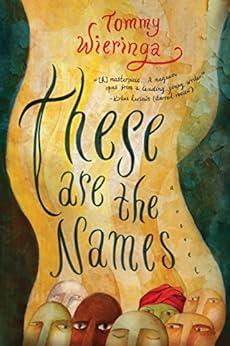I’ve an
interest in Dutch culture because of my husband’s Dutch heritage so when I came
across this title by a Dutch writer in some Best Books of 2016 lists, I decided
to read it. I’m glad I did.
Alternating
chapters tell two stories which eventually merge. In a fictional Eastern European town bordering
on the Western Steppe, 53-year-old Pontus Beg, the police commissioner, searches
for meaning for his lonely life. Walking
west on the steppes is a small group of refugees fleeing poverty and
repression. Eventually, Beg meets the
migrants when they arrive in his town carrying evidence of a crime.
The novel’s
title taken from the opening lines of the Book of Exodus clearly indicates one
of its major themes: migration. The frail and starving refugees spend months
on the featureless and desolate steppes, like the Israelites who wandered for
40 years in the wilderness. They are not
identified by name; they are known as the tall man, the poacher, the young boy,
the woman, the Ethiopian, etc. Over
time, they lose their possessions and their pasts; some even lose their
lives. Even “Their footsteps were wiped
out quickly behind them.” Considering
events in Europe, this is a very relevant theme.
The human
desire to begin again, to be reborn to a new life, is emphasized. Obviously, the refugees left their homes so
they could find new lives for themselves and their families. Beg, when he sees a synagogue’s ritual bath, imagines
being immersed in it and becoming a new person:
“What a pleasant, comforting thought . . . to shed his old soul, that
tattered, worn thing, and receive a new one in its stead. Who wouldn’t want that? Who would turn down something like that?”
Our common
humanity is also emphasized. Beg is told
by a rabbi that Jews are “’a braided rope, individual threads woven to from a
single cord. That’s how we are linked’”
but that connection obviously applies to all humanity. A refugee looks at the body of one of his
fellow travelers and makes a realization:
“What were the differences between them again? He couldn’t remember. It had to be there, that bottomless
difference, but his hands clutched at air.
Now that the delusions had lifted, he saw only how alike they had been
in their suffering and despair.”
Part of
that humanity is an instinct for self-preservation. What people will do to survive is
amazing. The woman in the group resorts
to eating sand. The young boy is
horrified and understands the feral nature of her actions when he says, “’You
can’t eat sand! People don’t eat sand!’” The need to survive means stripping bodies of
their clothing and precludes kindness towards others. When one of the refugees gives some food to another
who is so weak from lack of food that he is struggling to continue, his
compassion is perceived as strange. Even
the one who is saved by the man’s self-sacrifice questions his benefactor: “The black man helped him move along and
supported him when he could go no farther, but that also meant he was to blame
for the way his earthly suffering dragged on.
Gratitude and hateful contempt chased each other like minnows at the
bottom of a pool.” The young boy best summarizes
the disturbing behaviour he witnesses: “And
along his way he has seen almost every sin you could imagine – there are so
many more of them than he’d ever realized!”
As I read
this book, I was reminded of Voltaire’s statement that, “If God did not exist,
it would be necessary to invent Him.” Voltaire was arguing that belief in God is
beneficial and necessary for society to function. The migrants, trying to find meaning in their
circumstances, form beliefs resembling a religion: “a shared conviction took hold.”
One of the travelers justifies their plundering an old woman’s food supplies by
stating, “’She was there for us, so that we could go on.’” They believe they were lead to her by their bodiless
god because “they had been chosen”; Beg questions one of the survivors: “’He was on your side; he was only there for
you people. Not for some feeble-minded
woman; only for you. He allowed you to
rob her of everything she had because you people were his favourites, am I
right?’” Of course this idea of
chosenness is to remind the reader of the belief of the Jews that they are God’s
chosen people.
This novel
could be called a parable for contemporary times. It seems a simple story but has several
messages. A re-reading would undoubtedly
reveal more depths.

No comments:
Post a Comment